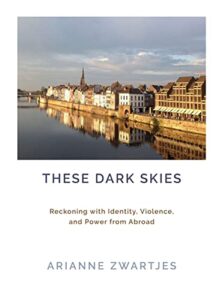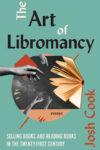
[University of Iowa Press; 2022]
Trash interests me. Trash tells stories. I’m standing on a raised platform, next to a black waste can, waiting for a train to take me downtown. I’m strategically positioned. I peer deep into the black bin: Plastic water bottles butt against beer cans, rolled up diapers, loose Cheetos. On top of the pile, a still wet peach slice gleams in the late afternoon sun. I text a picture of the peach to my friend, a fellow trash enthusiast. She sends an emoji with bulging heart eyes, and the words, “Stay safe out there.” Her cautionary message confuses me. Then I remember that a few weeks ago a man suffering from mental illness fired a handgun on a crowded train in Brooklyn, injuring twenty-three people. Updates about his trial fill our feeds. So do articles about the alleged rise in violent crimes at L.A.’s metro stations. I don’t tell my friend I still feel safer on the train than driving on the freeway where 150 crashes happen a day. I say nothing because I know her warning makes sense: Humans are terrible at assessing risk.
We tend to overestimate or underestimate risk, says researcher Sheldon H. Jacobson. Often we confuse risk with lack of control. This is why many of us believe that speeding down the freeway is safer than flying over it. We assess risk emotionally. A plane crash, or subway attack, terrifies us because they’re unexpected events, out of our control. They remind us of our own precariousness. “Anyone can be unexpectedly vulnerable,” writes Arianne Zwartjes in her timely new essay collection, These Dark Skies: Reckoning with Identity, Violence, and Power from Abroad. When confronted with our own precarity, fear may be our first impulse. But, as Zwartjes reminds us, vulnerability can also be a source of connection. Throughout These Dark Skies, Zwartjes asks us to consider again and again the essential question of our time: Instead of ignoring or fearing our inherent precarity, how can we use our vulnerability as a basis of connection with other living beings?
Tellingly, These Dark Skies opens with a moment of domestic intimacy. In a kitchen in France, Zwartjes’s mother-in-law makes syrniki, a Russian version of pancakes. In the next room, Zwartjes and her wife Anna watch TV on mute. A chaotic scene unfolds on the screen: a large white truck speeds down a promenade then swerves into a crowd of people celebrating Bastille Day. Zwartjes and her wife are witnessing the 2016 Nice truck attack. “Shell-shocked victims slowly walk between metal barriers . . . Others sit, wrapped in gold-foil emergency blankets, echoing photos of refugees in rescue boats landing on the coasts of Italy and Spain,” writes Zwartjes. In this opening chapter, Zwartjes establishes the book’s basic structure: private moments of intimacy spliced with public acts of violence. On every page, Zwartjes shows us how our domestic spaces are already-always also political spaces.
Building upon the practice of autotheory, Zwartjes describes These Dark Skies as “autopolitics, mixing and interweaving personal narrative with thinking and research in social constructions of identity, racial constructions, power, and violence.” Like autotheory, autopolitics is “a space where the pleasures of theorizing meets the pleasures of candor,” as Lauren Fournier puts it in Autotheory as a Feminist Practice. Transgressing traditional genre boundaries, autopolitics makes room for research, theory, embodied experiences, current events, self-doubt, contradictions, critique, and unruly feelings. Crucially, autopolitics offers alternative narrative arcs for autobiographical writing where the narrator’s epic search is not who am I? So much as how do I exist in this world alongside others?
“I began this book trying to write about violence and connection,” says Zwartjes. “Why are we, as a species, so prone to violence?” The author’s bewilderment in the face of humanity’s violence initially struck me as naive. But as I read on, I began to wonder why I was so quick to dismiss bewilderment as a way of navigating the world.
An American living abroad in Europe, Zwartjes experiences profound bewilderment as she witnesses the refugee crisis unfold in real time. Since 2014 over 1.9 million people have landed on banks of the Mediterranean Sea, the main route to Europe for migrants trying to enter the continent. In 2021 alone, 1,369 people died or went missing at sea. What was once an abstract world event is now a reality that confronts her daily. Her proximity to the crisis allows her to conceptualize the enormous risk each person took to arrive on those shores. She sees their vulnerability up close.
As Zwartjes traverses international borders with ease, she begins to scrutinize her role as a white American abroad. Despite her status as a foreigner, her identity ensures her deferential treatment in most places. At the same time, she is increasingly aware that her white face is a symbol of US imperialism, the source of so much abuse and anguish around the world. No matter how much she wishes to distance herself from her origins, she cannot flee history.
Perhaps one of the greatest privileges of living in a dominator society like the US is freedom from the burden of seeing oneself as a historical subject. Like many white Americans, Zwartjes once believed the delusion that our identities are self-defined, determined by personality, gender, religious beliefs, and aesthetics. This worldview conveniently ignores the societal contexts in which we are formed.
“I perhaps do not understand the ways in which growing up in a dominator culture . . . has deeply shaped my consciousness,” Zwartjes writes early in the book. Here, and throughout the text, she uses the present tense to describe feelings, thoughts, and events that occurred in the past as well as the ongoing present. The present tense injects urgency into the narrative and structurally reiterates how current events are inextricably linked to the past.
When a crisis erupts at the Malakasa refugee camp in Greece, Zwartjes volunteers to assist with relief work. The majority of the 1,110 people then living in the camp are from Afghanistan. These individuals risked their lives to flee famine, violence, and ecological degradation largely caused by years of US and Russian military intervention. Zwartjes hopes her training as an EMT will “make a difference.” On the ground, however, she soon realizes that her urge to “do something” might have more to do with shielding herself from feelings of complicity than an innocent desire to help. As Zwartjes shows us, her desire to “change the world” is rooted in her experience living in a dominator society, one that believes it can do for others what they cannot do for themselves.
“As soon as you get there,” Zwartjes writes, “You realize, I can be here or not be here, it makes not one iota of difference, the systems people are up against are so massive and intractable.” In a passage stripped of sentimentality, Zwartjes links her experiences at the Malakasa camp with studying abroad as a college student in East and South Asia and in Central America. “We spoke with many local activists and learned about significant issues impacting peoples’ lives,” she tells us. “Yet, whenever any of us asked what we could do to help this issue . . . we were met with an extremely consistent answer: go home.”
Zwartjes’s rejection of sentimentality is both an aesthetic choice and a political one. Sentimentality obscures power relations, allowing us to indulge in the spectacle of sympathy. Zwartjes’s decision to include her misguided trip to Malakasa betrays her deep commitment to autopolitics. By allowing us to see the evolution of her thoughts and actions over time, she subverts the myth that political engagement is linear. For Zwartjes there is no single moment of enlightenment. Our politics, like our identities, are constantly in flux, responsive to the world around us. In These Dark Skies, “living politically” is not about possessing a perfect understanding of history or geopolitics. Nor is it about having the correct set of beliefs. It’s about how we live beside others.
By refusing to perform perfect politics, Zwartjes creates room for personal growth. She lets us witness her discombobulation, but also how she moves through it. “I find myself turning to art over and over, for new ways of seeing into the human dilemmas that have me mired in a place of profound bewilderment,” she writes. Art can be a potent counteragent to indifference and apathy by amplifying connection. Through art we can emotionally access things we otherwise would not allow ourselves to feel, such as guilt, impotence, vulnerability, and disillusionment. Metaphors, in particular, can help us cope with our bewilderment in the face of human brutality. Especially our own. By engaging wonder and paradox, metaphors allow us to emotionally explore what we cannot fully comprehend. Consider the poet Fanny Howe, who embraces both metaphor and bewilderment as a part of her writing practice. “Bewilderment,” says Howe, “[is] a way of entering the day as much as the work.”
Howe’s quote is one of many I hand copied into my notebook before searching for its origin. One of the joys of reading These Dark Skies is encountering Zwartjes as a reader. Her sources are eclectic and idiosyncratic. Each quote is worth savoring on its own, but they also offer intimate glimpses into the evolution of her thinking. Quotes from friends and family appear with equal weight on the page next to heavy hitters like Sontag and Aristotle, enhancing the text’s intimacy. As I tracked down each source, the book’s intimacy lived on, spooling out, connecting me to a constellation of other authors who kept me company for weeks. In this way, These Dark Skies embodies one of the key functions of art: increasing human connection. Zwartjes’s prose is a powerful antidote to loneliness, apathy, and the myth of perfect politics.
Elizabeth Hall is the author of the books I HAVE DEVOTED MY LIFE TO THE CLITORIS, a Lambda Literary Award Finalist in nonfiction, and Season of the Rat, forthcoming from Tarpaulin Sky Press in Fall 2022. Her essays have appeared in Bitch, Electric Literature, Los Angeles Review of Books, The Observer, and elsewhere.
This post may contain affiliate links.







